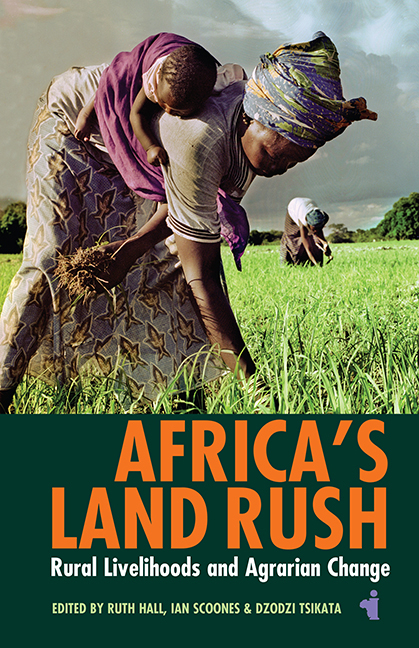Book contents
- Frontmatter
- Contents
- List of Maps, Tables & Figures
- Notes on Contributors
- Preface
- Acknowledgements
- List of Abbreviations
- 1 Introduction: The Contexts & Consequences of Africa’s Land Rush
- 2 State, Land & Agricultural Commercialisation in Kwara State, Nigeria
- 3 Recent Transnational Land Deals & the Local Agrarian Economy in Ghana
- 4 Large-Scale Land Acquisitions in Ethiopia: Implications for Agricultural Transformation & Livelihood Security
- 5 Land Deals & Pastoralist Livelihoods in Laikipia County, Kenya
- 6 Land Deals in the Tana Delta, Kenya
- 7 The State & Foreign Capital in Agricultural Commercialisation: The Case of Tanzania’s Kilombero Sugar Company
- 8 Trapped between the Farm Input Subsidy Programme & the Green Belt Initiative: Malawi’s Contemporary Agrarian Political Economy
- 9 Agrarian Struggles in Mozambique: Insights from Sugarcane Plantations
- 10 South African Commercial Farmers in the Congo
- References
- Index
3 - Recent Transnational Land Deals &the Local Agrarian Economy in Ghana
Published online by Cambridge University Press: 21 May 2021
- Frontmatter
- Contents
- List of Maps, Tables & Figures
- Notes on Contributors
- Preface
- Acknowledgements
- List of Abbreviations
- 1 Introduction: The Contexts & Consequences of Africa’s Land Rush
- 2 State, Land & Agricultural Commercialisation in Kwara State, Nigeria
- 3 Recent Transnational Land Deals & the Local Agrarian Economy in Ghana
- 4 Large-Scale Land Acquisitions in Ethiopia: Implications for Agricultural Transformation & Livelihood Security
- 5 Land Deals & Pastoralist Livelihoods in Laikipia County, Kenya
- 6 Land Deals in the Tana Delta, Kenya
- 7 The State & Foreign Capital in Agricultural Commercialisation: The Case of Tanzania’s Kilombero Sugar Company
- 8 Trapped between the Farm Input Subsidy Programme & the Green Belt Initiative: Malawi’s Contemporary Agrarian Political Economy
- 9 Agrarian Struggles in Mozambique: Insights from Sugarcane Plantations
- 10 South African Commercial Farmers in the Congo
- References
- Index
Summary
Introduction
Contemporary large-scale transnational land transactions in Ghana are occurring within a context of agrarian stagnation, the failure of agrarian transformation and on-going livelihood crises in Ghana's countryside. Land tenure systems are also in a state of flux, the subject of aggressive reforms to strengthen the liberalisation of land markets. This has become a platform for the take-over of agricultural lands by the rural elite with the support of the state and urban elite. Indeed, there is an on-going long-term process of land concentration and dispossession of small-scale farmers. More recent transnational land deals, which accelerated in the 1980s as a result of increased foreign investment in mining and logging, deepen this process (Agbosu et al. 2007). While these developments are occurring across Ghana, their specific manifestations are determined by the nature of the customary land tenure systems of particular areas.
Ghana as a site of transnational land acquisitions is interesting not for the size of acquisitions, but for their significant cumulative effects on the agrarian political economy. Unlike other African cases, agricultural lands are mainly held and transacted under customary land tenure systems in Ghana, which has a long history of smallholder-based agriculture, even for export farming. This chapter examines three recent commercial land deals for agribusiness projects in rural Ghana: the Prairie Volta Rice Company Ltd based in the Volta Region, Solar Harvest Ltd (formerly Biofuel Africa Ltd) and the Integrated Tamale Fruit Company (ITFC), the latter both based in the Northern Region (see Map 3.1). All three transactions are mature enough for their livelihood outcomes to be examined.
The data presented are from a mix of research methods, including in-depth individual interviews with 24 local male and female farmers in the three communities most affected by the land deals; focus group discussions with all-male and all-female groups in the three communities; key informant interviews with traditional authorities and their officers and company officials; and a survey of 300 individuals in the three project sites.
The chapter examines the three case studies in terms of three broad areas of change in the agrarian structure: land tenure and commercialisation; livelihoods and food security; and agrarian struggles. It offers some conclusions and recommendations for reforming the governance of commercial land transactions in Ghana.
- Type
- Chapter
- Information
- Africa's Land RushRural Livelihoods and Agrarian Change, pp. 46 - 64Publisher: Boydell & BrewerPrint publication year: 2015
- 3
- Cited by



